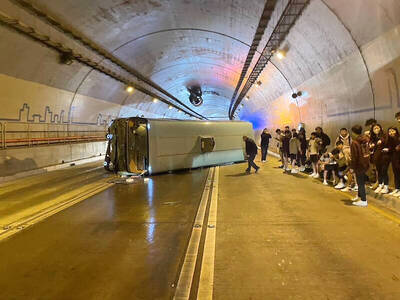Pro-unification supporters yesterday expressed disappointment over President Ma Ying-jeou's (馬英九) reluctance to strike a peace agreement and start a military confidence-building mechanism (CBM) with China, saying he had backed away from difficulties instead of showing leadership.
Chao Chun-shan (趙春山), president of the Foundation on Asia-Pacific Peace Studies, a think tank affiliated with the Presidential Office’s National Security Council, told a forum on Oct. 16 that three conditions must be satisfied before Taiwan would be willing to engage in political negotiations with Beijing.
These conditions are the signing of an economic cooperation framework agreement (ECFA) and a financial memorandum of understanding (MOU), achieving a domestic consensus and acceptance by the international community.
The three conditions were interpreted by pro-unification academics at the meeting held by the Taiwan Competitiveness Forum as a message from Ma that he has no intention of talking about a peace agreement and CBM during this term of office.
Chang Yia-chung (張亞中), a professor of politics at National Taiwan University, said the three conditions and recent developments in Taiwan-US relations were signs that cross-strait talks did not form part of Ma's political agenda.
“What Chao said were merely excuses to stall political negotiations, as he was meant to let the public know how difficult it was to sign a peace agreement and begin a CBM,” Chang said.
He added that Ma had recently changed the guiding principle on the administration's cross-strait policy from “economics first, then politics” to “only economics, no politics,” as well as prioritized US-Taiwan relations over cross-strait affairs.
That Ma had urged China to remove its missiles, stressed the importance of arms procurement from the US and the appointment of Andrew Yang (楊念祖), who has close ties to the US, as deputy minister of defense, suggested that Ma had no plans of holding political talks with China, Chang said.
Nan Fang Shuo (南方朔), a political commentator, said Ma was a leader with no leadership.
“Ma decides his policy agenda according to whichever way the wind blows and uses it to dodge difficulties. Even with the issue of whether Taiwan should sign a peace agreement with China, he wants the public, the US, Japan to decide,” he said.
Wang Hsiao-po (王曉波), a professor of philosophy at National Taiwan University, urged the Presidential Office to clarify whether Ma had changed his position on the role of the US in cross-strait political negotiations.
“When interviewed after his inauguration last year, Ma argued that intervention by the international community was inappropriate. The third prior condition cannot be met unless the US changes its Taiwan policy,” Wang said.
Huang Kuang-kuo (黃光國), a professor of psychology at National Taiwan University, suggested Ma set up a cross-party commission and solicit public opinion on a cross-strait peace agreement and a CBM.
Lin Cho-shui (林濁水), a former Democratic Progressive Party legislator, said Ma was clearly in a difficult situation about how to implement his pledges on a peace agreement and a CBM.
The president’s diplomatic truce policy has not earned him a commitment from Chinese President Hu Jintao (胡錦濤) that Taiwan has its own interpretation of “one China” but has led Taiwanese to suspect he might compromise the nation’s sovereignty, Lin said.
“When pushing for a cross-strait peace agreement and a CBM to be placed on the table, we have to ask are we really in such a rush to have political talks? If not, we won't be on an equal footing in the talks. In a democracy, it's not something politicians should do and it won't succeed,” Lin said.

The Central Weather Administration (CWA) today issued a "tsunami watch" alert after a magnitude 8.7 earthquake struck off the Kamchatka Peninsula in northeastern Russia earlier in the morning. The quake struck off the east coast of the Kamchatka Peninsula at 7:25am (Taiwan time) at a depth of about 19km, the CWA said, citing figures from the Pacific Tsunami Warning Center. The CWA's Seismological Center said preliminary assessments indicate that a tsunami could reach Taiwan's coastal areas by 1:18pm today. The CWA urged residents along the coast to stay alert and take necessary precautions as waves as high as 1m could hit the southeastern

The National Museum of Taiwan Literature is next month to hold an exhibition in Osaka, Japan, showcasing the rich and unique history of Taiwanese folklore and literature. The exhibition, which is to run from Aug. 10 to Aug. 20 at the city’s Central Public Hall, is part of the “We Taiwan” at Expo 2025 series, highlighting Taiwan’s cultural ties with the international community, National Museum of Taiwan Literature director Chen Ying-fang (陳瑩芳) said. Folklore and literature, among Taiwan’s richest cultural heritages, naturally deserve a central place in the global dialogue, Chen said. Taiwan’s folklore would be immediately apparent at the entrance of the

Speeding and badly maintained roads were the main causes of a school bus accident on a rainy day in Taipei last year that severely injured two people and left 22 with minor injuries, the Taiwan Transportation and Safety Board said. On March 11 last year, a Kang Chiao International School bus overturned inside the Wenshan Tunnel (文山隧道) on the northbound lane of the Xinyi Expressway. The tour bus, owned by Long Lai Co, exceeded the speed limit after entering the tunnel, the board’s investigation found. Sensing that the rear of the vehicle was swaying, the driver attempted to use the service and exhaust

“China is preparing to invade Taiwan,” Deputy Minister of Foreign Affairs Francois Wu (吳志中) said in an exclusive interview with British media channel Sky News for a special report titled, “Is Taiwan ready for a Chinese invasion?” the Ministry of Foreign Affairs said today in a statement. The 25-minute-long special report by Helen Ann-Smith released yesterday saw Sky News travel to Penghu, Taoyuan and Taipei to discuss the possibility of a Chinese invasion and how Taiwan is preparing for an attack. The film observed emergency response drills, interviewed baseball fans at the Taipei Dome on their views of US President